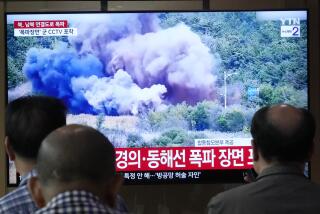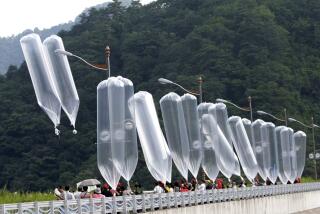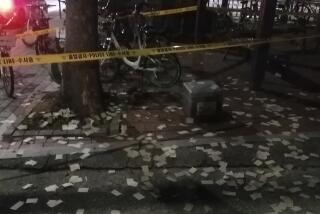Japan Shrugs Off N. Korean Threats Over Inspections
- Share via
TOKYO — Japan on Thursday brushed off threats by Pyongyang that it would torpedo relations between the two countries unless Tokyo eased up on maritime restrictions against North Korean vessels.
“We have conducted such inspections in line with our law,” Chief Cabinet Secretary Yasuo Fukuda told reporters, adding that he hoped North Korea would judge Japan’s newly tightened inspection procedures against the communist state in a “reasonable and cool-headed manner.”
North Korea suspended the only ferry service to Japan this week in response to the tough talk from Tokyo on ship inspections. Japanese officials say the crackdown is needed in part to prevent shipment of consumer goods that could be converted to military hardware. These include everything from high-end Japanese golf clubs -- extracted titanium carbon fibers are used in missile housings -- to off-the-shelf global positioning system hardware capable of steering missiles; to electronic fish finders that can be converted to sonar devices.
Even the lenses of store surveillance cameras can find a second life as submarine periscopes, experts said, and something as mundane as high-quality shampoo can be filtered for its triethanolamine and used in making chemical weapons.
“Any time they order huge amounts of anything, or buy expensive things, that should make us suspicious,” said Shigeharu Aoyama, director of Japan’s Independent Institute, a think tank based in Tokyo. “There are a lot of difficult judgment calls.”
While many of these items are widely available around the world, Japan’s close geographic proximity, the ferry service between the two nations and a sizable population in Japan with ancestral ties to North Korea means that Japan is Pyongyang’s shopping center of choice.
Japan -- which has various export-control laws and protocols in place, including a version of the 1991 U.S. “catch-all” Enhanced Proliferation Control Initiative it passed in 2002 -- has neither the inclination nor the time to block shampoo shipments. But it does have more authority to stop some sophisticated dual-use items.
Exports of more than two Sony PlayStation 2 video game players, for instance, are subject to Japanese export licenses, given their potential use in missile guidance systems. Also subject to review are airtight beer fermentation tanks of over 100 liters, given their potential use in incubating large quantities of biological hazards.
Japan’s trade ministry said that it turned down a request from several Japanese-based trading companies who had sought permission between December and March to export 30-ton tractor-trailers to North Korea. North Korea is woefully short of large vehicles capable of transporting mid-range ballistic missiles.
In reality, however, analysts say it’s a pretty leaky barrier. “It’s impossible to stop everything,” said Hideya Kurata, a professor of nuclear security at Tokyo’s Kyorin University. “A lot of this is just a big performance by the Japanese government.”
Other seemingly everyday items in an advanced economy that officials here say they’re worried about include freeze-drying equipment used by instant-food manufacturers, which might have a second life in biochemical weapons production, and hydrogen fluoride, which could be of use in processing uranium.
“We all know suspicious goods are being sent to North Korea, and we try and check thoroughly whenever necessary,” said Satoshi Shimono, an official with the Osaka customs office. “We have a list of export control items, but the list is secret, so no one can know exactly what we’re looking for. But it can be a difficult task given that even used aluminum tire rims can supposedly be extracted to form parts of warheads.”
Toshio Miyatsuka, an expert on North Korea at Yamanashi Gakuin University, said Pyongyang also scoops up used tires for fuel and old refrigerators containing chlorofluorocarbons, which it extracts to wash computer chips. And it fills ships returning to North Korea with huge numbers of used bicycles, he added, that it buys cheaply from local governments via intermediaries after they’re abandoned outside rail stations. Once back in North Korea, the ball bearings are extracted for military use, Miyatsuka said.
Last month, a North Korean defector testified before U.S. Congress that 90% of the components used in Pyongyang’s missile program came through the now suspended ferry service. Japanese were further jarred when a North Korean spy ship recently salvaged from the seabed off Japan turned up brimming with Japanese technology.
But Wednesday at the Japan seaport of Maizuru, where a North Korean vessel was briefly detained for safety infractions, a local official said it was business as usual.
“I heard [Japanese Transport Minister Chikage Ogi] declare we were going to tighten up the system, but we haven’t heard anything from our bosses about it,” said Masami Nakamori, an official with the Maizuru safety inspection bureau. “We’re just doing ordinary port patrols, nothing more.”
In its commentary following Japan’s announcement, Pyongyang slammed Japan for suggesting that its ferry was transporting spies and nuclear and missile-related parts. “This damages the great authority and image of our homeland,” the state news agency said.
Meanwhile, on Thursday, Japanese police arrested five executives of Tokyo-based Seishin Enterprises on charges of illegally exporting sophisticated jet mills to Iran. The machinery can be used to help make solid rocket fuel for missiles.
*
Hisako Ueno in The Times’ Tokyo Bureau contributed to this report.
More to Read
Sign up for Essential California
The most important California stories and recommendations in your inbox every morning.
You may occasionally receive promotional content from the Los Angeles Times.













